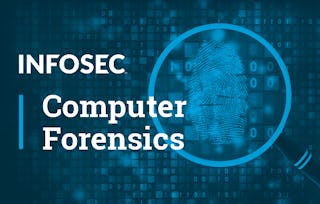In the Digital Forensics Concepts course, you will learn about legal considerations applicable to computer forensics and how to identify, collect and preserve digital evidence. This course dives into the scientific principles relating to digital forensics and gives you a close look at on-scene triaging, keyword lists, grep, file hashing, report writing and the profession of digital forensic examination.

Digital Forensics Concepts

Digital Forensics Concepts
This course is part of Computer Forensics Specialization

Instructor: Denise Duffy
17,742 already enrolled
Included with
266 reviews
What you'll learn
The student will learn how to identify, collect and preserve digital evidence.
The student will be able to understand scientific principles relating to digital forensics.
The student will be able to understand concepts like keyword lists, grep, file hashing, and report writing.
Skills you'll gain
Details to know

Add to your LinkedIn profile
1 assignment
See how employees at top companies are mastering in-demand skills

Build your subject-matter expertise
- Learn new concepts from industry experts
- Gain a foundational understanding of a subject or tool
- Develop job-relevant skills with hands-on projects
- Earn a shareable career certificate

There are 11 modules in this course
This introductory course provides a broad overview of computer forensics as an occupation by exploring methodologies used surrounding digital forensics. In addition, the student acquires open-source forensic tools to use throughout this path.
What's included
4 videos3 readings
In this module, you'll explore the laws that apply to digital forensics. Multiple state and federal laws apply to the field of digital forensics, as well as ethical concerns. This module demonstrates information commonly needed in a search warrant and a preservation request. The scope of search authority is covered, as well as the limitations of a consent search and guidelines surrounding wiretaps.
What's included
3 videos
An introduction to the scientific principles of digital forensics. This module covers scientific principles that apply to digital forensics. The student learns about transfer of evidence, the difference between a witness and an expert witness and "big data" concerns and solutions.
What's included
2 videos
Prepare for the practical side of forensic examinations with this module on physical evidence handling. In addition to forensic examinations, most digital investigators must understand how to manage physical evidence before, during and after leaving the scene. This module explores what to bring to a scene and how to prepare and label digital evidence for documentation purposes. You'll also examine how to collect and preserve the evidence for transportation and secure storage.
What's included
5 videos
Explore the details of digital device triage. Triaging a digital device is essential knowledge. Proper on-scene triage prevents the loss of volatile data and the collection of unnecessary devices. This module discusses capturing RAM, recognizing and dealing with encryption and destructive processes and triaging devices with a forensic boot media.
What's included
3 videos
A look at hash values and hash algorithms. In this module, the student learns how to use hash values as a way to include or exclude files from an investigation. This includes a discussion of different types of hash algorithms and how to hash individual files versus hashing drives.
What's included
3 videos
In this module, you'll explore the importance of creating a disk image. Forensic examiners need to be meticulous in their work to avoid cross-contamination when creating a bit-stream copy. This module explains the importance of sterilizing media, how to validate tools, proper application of the write-blocker and validating the forensic bit-stream copy.
What's included
5 videos
Explore the details of keyword and grep searches. How to conduct a keyword search using automated tools and how to establish a keyword list is covered in this module. The student receives an overview of grep, as well as completing a grep search using an automated tool.
What's included
4 videos
A look at network basics for the computer forensics investigator. This module describes what a network is, how it functions, what IP addresses are and an IP address’s function on the network. This module also explores what a MAC address is and why it is vital to network forensics. Internet protocols are also covered.
What's included
4 videos
A look at the importance of reporting and peer review. Report writing and peer review are of utmost importance. In this module, the student examiner learns what information to include and what does not belong in a final report. The student views several example reports, as well as generates a report using forensic software.
What's included
3 videos1 assignment
What's included
2 videos2 readings
Earn a career certificate
Add this credential to your LinkedIn profile, resume, or CV. Share it on social media and in your performance review.
Instructor

Offered by
Explore more from Security
 Status: Free Trial
Status: Free TrialInfosec
 Status: Preview
Status: PreviewStarweaver
 Status: Free Trial
Status: Free Trial Status: Free Trial
Status: Free TrialMacquarie University
Why people choose Coursera for their career

Felipe M.

Jennifer J.

Larry W.

Chaitanya A.
Learner reviews
- 5 stars
76.69%
- 4 stars
17.66%
- 3 stars
3.38%
- 2 stars
1.50%
- 1 star
0.75%
Showing 3 of 266
Reviewed on May 28, 2023
i love this course and its a good explanation and good topic for beginner to advanced.
Reviewed on Jun 27, 2022
very informative for those , who actually wants to learn what the computer forensics really is.
Reviewed on Nov 17, 2022
Great course! Too bad is not very practical and some thing seems out of order judging by the introduction to each week, but in terms of the actual content it is soooo good!

Open new doors with Coursera Plus
Unlimited access to 10,000+ world-class courses, hands-on projects, and job-ready certificate programs - all included in your subscription
Advance your career with an online degree
Earn a degree from world-class universities - 100% online
Join over 3,400 global companies that choose Coursera for Business
Upskill your employees to excel in the digital economy
Frequently asked questions
To access the course materials, assignments and to earn a Certificate, you will need to purchase the Certificate experience when you enroll in a course. You can try a Free Trial instead, or apply for Financial Aid. The course may offer 'Full Course, No Certificate' instead. This option lets you see all course materials, submit required assessments, and get a final grade. This also means that you will not be able to purchase a Certificate experience.
When you enroll in the course, you get access to all of the courses in the Specialization, and you earn a certificate when you complete the work. Your electronic Certificate will be added to your Accomplishments page - from there, you can print your Certificate or add it to your LinkedIn profile.
Yes. In select learning programs, you can apply for financial aid or a scholarship if you can’t afford the enrollment fee. If fin aid or scholarship is available for your learning program selection, you’ll find a link to apply on the description page.
More questions
Financial aid available,

